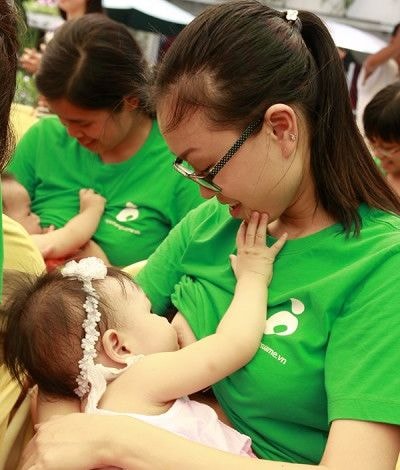The first breast milk bank in Vietnam comes into operation
Starting February 17, many Vietnamese children will receive care from a human milk bank. The first pilot bank in Vietnam is located at the Da Nang Maternity and Pediatrics Hospital. It is expected that the human milk bank will support the care and treatment of 3,000 to 4,000 children per year.
The human milk bank in Da Nang collects, pasteurizes, tests, and safely stores human milk from donors and provides it to infants with special needs, such as premature, low birth weight, or medical conditions. The human milk bank also protects, promotes, and provides advice and support for breastfeeding.
The source of milk donated to the bank is from healthy mothers, 18 years of age or older, who are willing to donate breast milk. Mothers will be examined and tested before donating milk. Mothers will have to stop donating milk while donating milk and need to use one of the drugs contraindicated for breastfeeding mothers; mastitis or abnormalities of the skin - around the breast; the child is discharged from the hospital and the mother is not able to donate milk at the milk bank; does not want to continue donating milk for any reason.
Children who receive milk from the Breast Milk Bank are those who are premature, underweight, have certain medical conditions, etc. while their mothers are away or absent, have little milk, or have some illness that prevents them from breastfeeding.
 |
| Breast milk is the best food for babies, at least for the first 6 months of life. |
Every year, more than 33,000 children under the age of 5 die in Vietnam. Research shows that among the solutions to reduce child mortality, breast milk is the most important and has an impact on child survival. The establishment of a human milk bank will help improve child survival and health. In particular, children will have access to safe breast milk, regardless of the circumstances of their birth.
The World Health Organization (WHO) estimates that breastfeeding is the single most important solution that could prevent more than 800,000 deaths (13% of all deaths) in children under 5 years of age. However, many children are still not fortunate enough to have access to their mother's milk, making them more vulnerable, especially if they are born prematurely or underweight, orphaned or severely malnourished. To date, there are about 550 breast milk banks in the world, of which Brazil is considered a pioneer with about 220 banks of different sizes.
In Vietnam, according to the National Institute of Nutrition, the rate of exclusive breastfeeding in the first 6 months is 24.3%. Lack of breastfeeding support combined with high cesarean section rates hinder the practice of breastfeeding.
According to PNVN
| RELATED NEWS |
|---|


